Meet the Winners of the Fifth Annual WSLA 2018 Women in Sustainability Leadership Awards
It's not easy standing up for what's right. And it's increasingly apparent, especially in today's climate, that women everywhere are fighting what may feel like an uphill battle. Often women working in sustainability-especially in the architecture, engineering, and construction industries-are unsung heroes. "Being the first woman in the field was not an easy task," says Yasmeen Lari, CEO of the Heritage Foundation Pakistan and the first female architect in Pakistan in the 1960s. "At the time, the only professions that were considered reputable for women were teaching and medicine, and there were very few women who were allowed to work outside their home."
It's women like Lari who inspire us every day to take risks and strive to ensure all voices are heard. It's an honor for us to shine a spotlight on Lari and others like her who are out there doing brilliant work, day after day, to make the world a better, healthier place. As part of our fifth annual Women in Sustainability Leadership Awards (WSLA 2018), our panel of esteemed judges combed through countless nominations to find 11 leading examples of women going above and beyond in their careers, giving back to their communities, and fighting the fight against climate change.
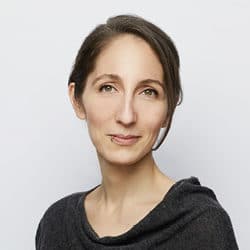
Jane Abernethy
Chief Sustainability Officer, Humanscale
After a decade working as a designer, Jane Abernethy transitioned to sustainability officer at Humanscale. The new job was out of her comfort zone at first, but she quickly took charge by reinventing the product development process with her Design for Environment program. Through this program, every new product is reviewed and approved by the sustainability team before moving to the next stage of development. "This has changed the way each designer and engineer works. It's changed the way they specify materials and evaluate their own progress," she says. "Most importantly, the optimal decisions they're making get repeated hundreds of thousands of times every year once the product goes into mass production."
She has been making the company's supply chain greener by ensuring its materials are healthy and sustainable. As a founding member of NextWave, she plans to utilize more ocean-bound plastics in products-she recently developed a chair made from recycled fishing nets, removing almost two pounds of plastic from the ocean for every chair produced. She also helped Humanscale receive the first full Living Product Challenge certification. Abernethy also established an internal team to drive sustainability initiatives, co-led by two women. "It's important for women to be supportive and to foster female leadership in others," she says. "I'm eager to develop a culture where women empower one another through mentorship and ongoing support."
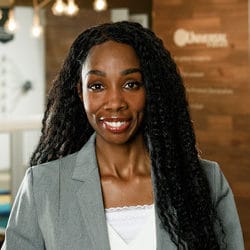
Ranae Anderson
Global Sustainability Leader, Universal Fibers, Inc.
Ranae Anderson fights for what's right. Today, the Tuskegee University graduate who earned a degree in chemistry is Universal Fibers' global sustainability leader, developing and executing strategic sustainability initiatives across the globe. She's worked in Asia to achieve virtual zero waste, oversees Health Product Declarations, and serves on the board of directors for Carpet America Recovery Effort (CARE). CARE works to divert carpet from landfills and sources end-use customers for recycled material in the recycling process. Anderson led the process and worked across industries to develop long-term initiatives that led to Universal Fibers' first Corporate Sustainability Report.
"Not long ago, the manufacturing industry was exclusively reserved for men," she says. "While a lot has changed over the years, manufacturing remains predominantly male, with 8 out of 10 positions held by men." As a result, she says shop floors often develop their own micro-cultures. When she became a manager, she sought to change negative attitudes. "The culture of plant workers was not receptive to outsiders-especially someone as different as me in age, gender, education, and race," Anderson says.
Culture, she says, cannot change without women in the room. "Women need other women in the workplace as role models and colleagues." At Universal Fibers, she initiates a female-only program to create a support system for colleagues and peers. Anderson also leads a company-wide training program to bring awareness and clear understanding of company commitments to sustainability all over the world. She is committed to mentorship outside of her full-time job as well, working with the Virginia Tech Peers STEM Program and Boys & Girls Club of The Mountain Empire.
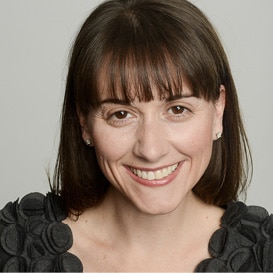
Jennifer Berthelot-Jelovic
President and CEO, A SustainAble Production
Jennifer Berthelot-Jelovic was producing movies and music before her sustainability and wellness career took off. It started in 2006 when her boss asked her to work on Hangar 25, a LEED Platinum aviation facility. "I sort of 'fell into' being an expert overnight, when my first project became world-famous for its success and innovation," she says. Since then, she's dedicated her career to creating healthier communities.
She was one of the first WELL accredited professionals and WELL Faculty in the world. "I was willing to learn and make mistakes in order to forward something I believed in to my core," she says. To date, she has worked on more than 100 WELL projects worldwide. She was a peer reviewer for v1.0 & v2.0 Pilot of WELL and continues to contribute to the standard's development.
Berthelot-Jelovic has been instrumental in other groundbreaking LEED projects, like Step Up On Vine, a permanent supportive housing project for homeless individuals with mental health issues. She inspires action as a member of the USGBC Green Schools Movement and has been a long-time leader in the USGBC-Los Angeles Chapter, serving on its board of directors for seven years. In 2015, she joined the Los Angeles Urban Land Institute's "Building Healthy Places" steering committee. Her company, A SustainAble Production, provides holistic sustainability and wellness consulting services for projects.
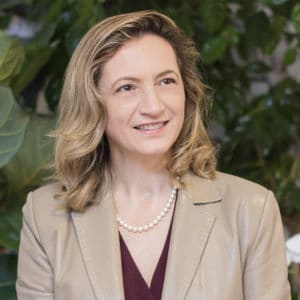
Dr. Christine E. Bruckner
Director, M Moser Associates
Dr. Christine E Bruckner was raised with a passion for architecture. "I began my career years ago with the belief from my mother that the role of an architect is 'to create places for people within which they can meet and exceed their own potential,'" she says, recalling lessons from her architect father and urban planning mother.
As a director of M Moser Associates, an office of 60% women, Bruckner has developed a WELL team, implementing environmentally friendly design all over the world. Committed to incorporating human health and well-being in design, the work has set many precedents, including the first WELL v1-certified project in Asia Pacific for GTB in Shanghai.
Bruckner shepherded formation of the AIA International Region and served as its first two-year president. She also cofounded Calexian-focused on energy-efficient, integrated solutions for existing buildings-and cofounded the nonprofit Southside Glass Recycling Initiative. She also focuses on architectural design and serves as a design studio reviewer, mentor, and Girl Scout leader.
A lot has changed since she was starting out, though. In school, nearly all of her professors were men. "I had an amazing freshman year female professor, Ms. Elinor Evans. Her eyes twinkled and her intensity was infectious," Bruckner says. "She had many challenges in her life as a female architect and academic with a unique methodology, yet at less than 5 feet tall, her power was undeniable, and she worked to mentor us in every way she could," she says. "That's a gift I strive to give back every day, letting women across the globe-whether in Hong Kong, New York, or Bangalore-know what they do matters."
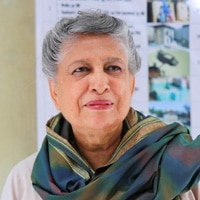
Yasmeen Lari
CEO, Heritage Foundation of Pakistan
Yasmeen Lari was the first female architect in Pakistan in the 1960s. "Being the first woman in the field was not an easy task," she says. "It was unheard of to find women working in unprotected environments such as building sites." Despite obstacles, she designed several landmark buildings in Pakistan, including the Finance and Trade Center and Pakistan State Oil House.
In 2000 Lari retired from her practice, but she remains active as CEO of the Heritage Foundation of Pakistan, which she cofounded with her husband. The foundation has preserved historic monuments in the World Heritage Sites of Makli and Lahore Fort. With UNESCO's support, Lari initiated the "Revitalization of Ancient Glazed Tiles in Sindh" project to teach ceramics in disadvantaged communities.
Lari has also worked to create sustainable housing for displaced people following natural disasters. After a devastating flood in Pakistan in 2010, she developed the largest zero carbon footprint shelter program in the world, making 40,000 green shelters from unfired brick masonry walls, lime, and bamboo. Her Green Shelters Project is a holistic model that gives access to shelter, water, sanitation, and safe stoves to marginalized communities. The project incorporates affordable, zero carbon, and zero waste elements that can withstand floods and earthquakes.
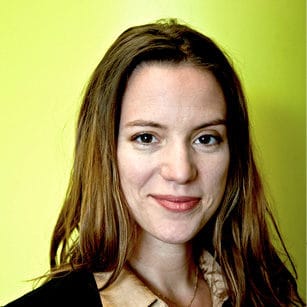
Gina LaMotte
Founder and President, EcoRise
Gina LaMotte is mobilizing the next generation of green leaders and innovators. In 2008 she founded EcoRise, a nonprofit that provides K-12 classroom programs focused on sustainability, design thinking, and social entrepreneurship. She aims to empower youth to take on real-world issues and transform schools into incubators for social change and green building. LaMotte has partnered with the USGBC and RIS (in Mexico City) to create curriculum in Spanish and launch an educational platform to reach teachers all over the world.
Unlike most nonprofits, LaMotte strives to support EcoRise's operating costs through a strong earned income model that counterbalances fundraising. "I have come to realize that my mindset, leadership style, and business strategy are perceived by the nonprofit community as a bit unconventional, she says. "I believe nonprofits need to leverage tools from the business world, identify opportunities for financial sustainability, and be prepared to take risks." She shows taking risks pays off-she participated in a nonprofit pitch competition and business accelerator program, which resulted in raising growth capital from the impact investor community in the form of a low-interest loan. This investment allowed EcoRise to double the number of classrooms it reached within a year and continue its expansion throughout the U.S.
Before EcoRise, LaMotte spent 10 years involved in educational programs serving youth internationally. She was also a facilitator and counselor at the Global Youth Peace Summit, a former co-chair of Austin ISD's Environmental Stewardship Advisory Committee, and a current member of the SXSWedu Advisory Board.
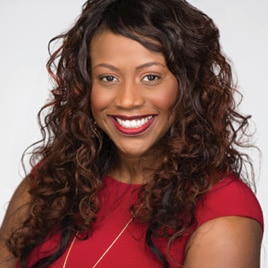
Kimberly Lewis
Senior Vice President Market Transformation & Development, North America, USGBC
It's hard to imagine Kimberly Lewis sitting on the sidelines, but she used to. "It's hard to believe now, because I have taken on a public-facing, prominent role with USGBC over the years, but that was not always my approach," she says. "I was blessed that, when I was prepared to fade away and play a supporting role, our former CEO Rick Fedrizzi said, 'No. You are the leader.' Coming out from behind the curtain has been an obstacle, and I can proudly say I have overcome it."
Since then, Lewis-also a minister-was hired by USGBC to launch the now massive Greenbuild Conference & Expo, built the Women in Green platform, and worked tirelessly as a mentor across the built environment and beyond. She directs USGBC's market development, delivering on its mission to improve life for all through more sustainable communities everywhere. She says Greenbuild is an example of lasting change. "It has lasted for nearly two decades and is still strong and growing, with shows in Europe, Mexico, India, and China this year." But the movement is about more than buildings. It's about people, too. "In the early days of USGBC, I wanted to be an example for minorities," she says. "I wanted to be a leader for people on the sidelines. Rick said no. He said I should be an example for all people, and he was right."
Lewis now directs USGBC's market development, delivering on its mission to improve life for all through more sustainable communities everywhere. "USGBC's current CEO Mahesh Ramanujambelieved in me and tapped me to oversee the USGBC's governance shift and evolution with our local members and advocates catalyzing our relevance and impact in local communities throughout North America by sharing and building local capacity and impact."
Lewis has been recognized as a White House Champion of Climate Change, was one of Glamour magazine's "70 Women Leaders to know in Sustainability," and has sat on many boards, from Groundswell to MPI's CSR advisory board. You can read more from Lewis here.
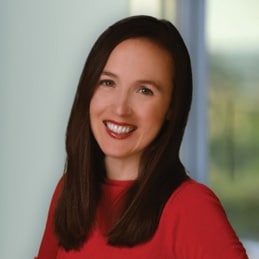
Sara Neff
Senior Vice President, Sustainability, Kilroy Realty Corporation
When Sara Neff started working at Kilroy Realty Corporation eight years ago, the company had no sustainability program. "It took courage as a newcomer to ask every person at KRC to change their perspective on sustainability," she says. "But our CEO John Kilroy understood the value of sustainability in real estate and told me he wanted us to lead the industry on it, so I ran with it."
It took guts to push forward, but Neff overcame negativity to implement successful sustainability programs at the company. She was so successful, in fact, that KRC recently announced that it will become the first real estate company in America to achieve carbon neutral operations, hitting that goal by the end of 2020. "That announcement has already created lasting change not just at our company, but the entire real estate industry."
KRC has already reduced its energy use by 15% since Neff joined and is working to install all possible onsite renewables and battery storage in addition to executing a large offsite power purchase agreement. Neff also works closely with USGBC as an Advisory Council member, created a higher education subcommittee targeting emerging professionals as chair of the USGBC Los Angeles board of directors, and is a BOMA Energy Education Program teacher.
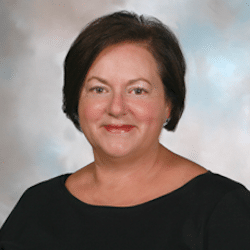
Kimberly Pittel
Group Vice President, Sustainability, Environment & Safety Engineering, Ford Motor Company
Kimberly Pittel began her career at Ford in 1985. As a long-time leader in the company, most recently in the sustainability sector, she has worked to eliminate inequalities in the workplace. "We have all come a long way since 1985, but there is still more progress to be made," she says.
Pittel is responsible for developing and implementing Ford's global environment and safety strategy, policy, and performance. Pittel also ensures Ford's campus and facilities are built within a sustainable framework. She recently established a company-wide sustainability strategy for all Ford organizations around the world. Using this integrated approach, all Ford employees, from product development to finance, pinpoint positive actions they can take to further Ford's sustainability mission.
"Henry Ford himself had a vision of 'farm to car' and experimented with the idea of using biomaterials such as soybeans to create plastics in our vehicles as far back as the 1940s," Pittel says, adding that currently, Ford not only uses soybeans, corn, and agave husks in its vehicle production, but also recycled materials like water bottles and even used jeans. The company has 87 (and counting) zero waste facilities, systematically reduced water usage and emissions, and increased safety.
Within Ford, Pittel serves as executive champion of Women in Sustainability, Environment & Safety Engineering, a global organization that emphasizes supporting women through personal and professional growth, improved work-life balance, and networking.
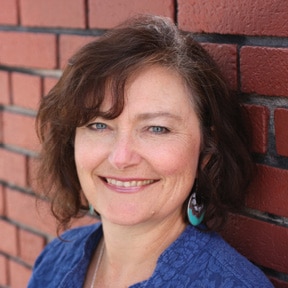
Andrea Traber
U.S. West Sustainability & Resilient Design Leader, Integral Group
Andrea Traber has long been a mentor and example in her field, with 20-plus years of experience as a project architect and principal. At Integral Group-the global mechanical, electrical, and plumbing engineering firm emphasizing high-performance buildings and climate change responsive design-she co-introduced the first mentoring program to develop young, diverse staff and increase retention. While the industry average for women in engineering is roughly 11%, Integral has 30% women in its US West region.
When Traber joined Integral in 2013, she presented the concept of a full scope sustainability practice. Within a year, the potential was clear and improvements were well on their way. Traber has led teams to achieve LEED certification on more than 70 projects. She cofounded the Women EmPowerment group in the San Francisco Bay Area as a quarterly gathering in the AECT world as a learning and mentoring group. "We have been meeting since 2014 and developed a shared leadership model to keep it going," she says, adding that 75 members regularly attend to explore sustainable design and construction in the region.
While building a greener world is of utmost importance to Traber, issues like gender pay equity remain top of mind. "I have brought up difficult topics and been part of solutions." She's an advocate for gender pay equity and making sure women are rightly considered for promotions.
"I lead by example and overcome all obstacles I encounter by using my intelligence and experience, my heart, and my ability to be a creative problem solver," she says. "I have chosen a path of leading internally through a strong mentoring ethic, which causes change from within the industry and our organization. I continually work with my male and female colleagues on growth within our organization and demonstrate how not to run away from challenging issues."
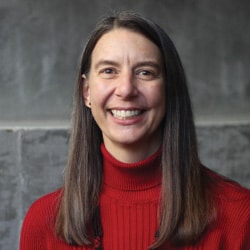
Alicia Daniels Uhlig
Living Community Challenge and Policy Director, International Living Future Institute
Alicia Daniels Uhlig was driven from a young age. "In high school, I convinced the school to change its policy and allow me to be placed in an architectural firm 20 hours a week starting my junior year," she recalls. "I vividly remember my first day, mustering courage and wondering, 'How can I contribute?'" Sustainability has been her consistent path that has manifested in wildly diverse experiences, each requiring courage.
In 2005, Uhlig joined architecture firm GGLO. As its director of sustainability, she oversaw drastic growth in LEED certified projects. At 39, she became the second female architect in GGLO's history to be promoted to principal. From leading the Capitol Hill Eco District planning effort in Seattle to working with the City of Seattle's Office of Sustainability & Environment to create the Seattle Climate Action Plan, she has helped to create transformative design that bridges the future of sustainability with the future of the built environment.
More than two years ago she became the Living Community Challenge and Policy Director at the International Living Future Institute (ILFI). "Now I utilize experience gained from past collaborative work-from work with UNESCO sites in the Mediterranean and North Africa to Berea College's earliest sustainability accomplishments on campus-and create a future of Living Communities that are culturally rich, socially just, and ecologically restorative." During her time at ILFI, Living Community Challenge registrations have more than tripled, awareness of the program has soared, and her own access to mentors and mentees has grown.
gb&d | gbdmagazine.com







